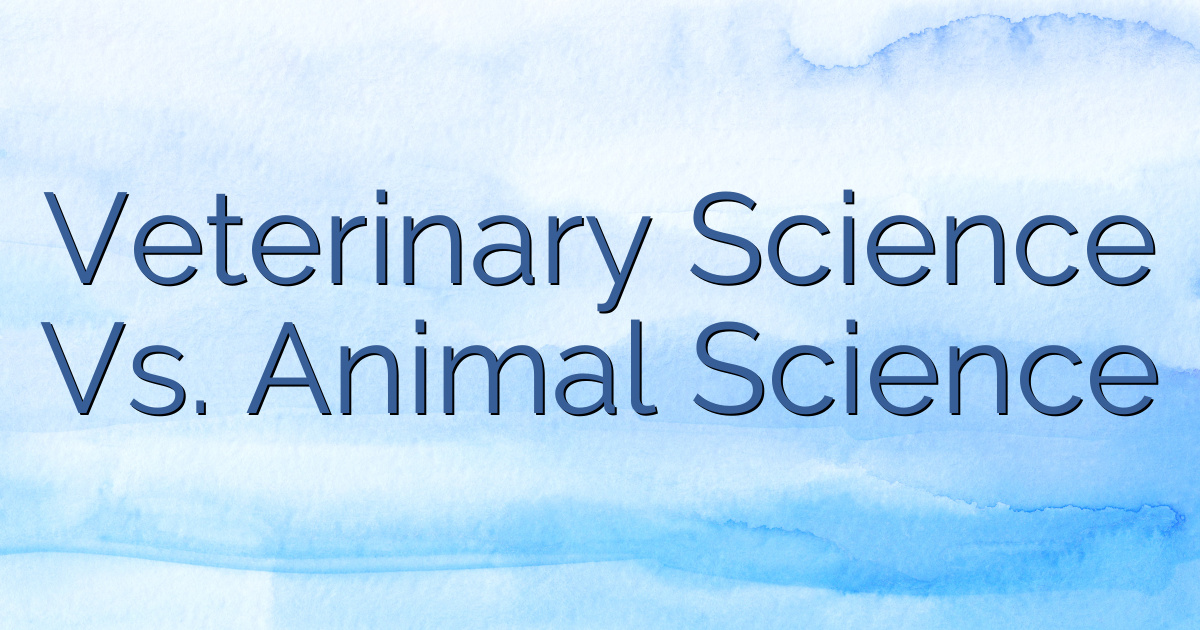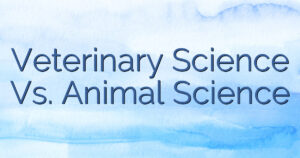
Are you considering a career in animal-related fields but are unsure whether veterinary science or animal science is the right path for you? Look no further!
This article delves into the differences and similarities between veterinary science and animal science, providing you with valuable insights to help you make an informed decision.
From the curriculum and coursework to the career opportunities and salary potential, we will explore all the key aspects to guide you in choosing the best major for your future.
Table of Contents
Key Takeaways
- Veterinary science focuses on animal diseases and health issues, while animal science focuses on animal production and management.
- Veterinary science heavily relies on technological advancements, while animal science primarily focuses on nutrition, reproduction, and genetics.
- Veterinary science prepares students for careers as veterinarians, while animal science provides a broader understanding of animal management.
- Veterinary science develops skills in animal anatomy, physiology, pharmacology, pathology, and clinical rotations, while animal science focuses on overall management and production of livestock and farm animals.
Overview of the two majors in veterinary science and animal science careers
An overview of the two majors in veterinary science and animal science careers can help students make informed decisions about their future paths.
When it comes to research opportunities, veterinary science and animal science differ in significant ways.
In veterinary science, research is focused on studying and finding solutions to various animal diseases and health issues. This field heavily relies on technological advancements, such as diagnostic imaging, genetic testing, and surgical techniques, to improve animal healthcare.
On the other hand, animal science research primarily focuses on animal production and management, including areas like nutrition, reproduction, and genetics.
While both fields benefit from technological advancements, veterinary science heavily relies on cutting-edge technologies to diagnose and treat animal diseases, while animal science utilizes technology to optimize animal production and enhance animal welfare.
Understanding these differences can help students choose the path that aligns with their interests and career goals.
Overview of the curriculum and coursework of the two majors
Take a look at the curriculum and coursework for both majors – you’ll see the differences between them right away.
Here’s a breakdown of the course requirements for veterinary science and animal science:
- Veterinary Science:
- Emphasizes on animal health and medicine.
- Core courses include anatomy, physiology, pharmacology, and pathology.
- Practical experience through clinical rotations and internships.
- Animal Science:
- Focuses on the study of animals and their management.
- Core courses include animal nutrition, genetics, reproduction, and behavior.
- Practical experience through hands-on labs and fieldwork.
While both majors have a strong foundation in biology and animal sciences, veterinary science places more emphasis on medical aspects, preparing students for careers as veterinarians. Animal science, on the other hand, equips students with a broader understanding of animal management, research, and agricultural practices.
Overview of coursework, assessments, and evaluation methods
Check out the coursework, assessments, and evaluation methods in both majors – you’ll get a clear understanding of how your progress will be measured. In veterinary science, the coursework content focuses on animal anatomy, physiology, pharmacology, and pathology. The practical assessments include clinical rotations, where you gain hands-on experience treating animals under supervision. Evaluation methods in veterinary science often include written exams, practical exams, and case studies. On the other hand, animal science coursework content covers topics like animal nutrition, genetics, reproduction, and behavior. Practical assessments in animal science may involve farm visits, laboratory experiments, and research projects. Evaluation methods in animal science often include lab reports, oral presentations, and group projects. Both majors provide a comprehensive assessment of your knowledge and skills in their respective fields.
| Veterinary Science | Animal Science |
|---|---|
| Animal Anatomy | Animal Nutrition |
| Animal Physiology | Animal Genetics |
| Pharmacology | Animal Reproduction |
| Pathology | Animal Behavior |
Comparison of Skills Developed in Veterinary Science vs. Animal Science Careers
If you pursue a career in veterinary science, you’ll develop skills in animal anatomy, physiology, pharmacology, pathology, and clinical rotations. These skills are essential for diagnosing and treating various animal diseases and injuries. In comparison, a career in animal science focuses more on the overall management and production of livestock and farm animals.
Here are four key skills that differentiate the two careers:
- Medical expertise: Veterinary science emphasizes clinical knowledge and skills to provide medical care to animals, while animal science focuses on livestock management and production techniques.
- Pharmacological proficiency: Veterinarians must possess a deep understanding of animal pharmacology to administer medications and determine proper dosages. Animal scientists may also require some knowledge of pharmaceuticals but not to the same extent.
- Surgical skills: Veterinarians are trained in surgical techniques and procedures to perform surgeries on animals when necessary. Animal scientists generally do not perform surgical procedures.
- Pathological analysis: Veterinarians learn how to examine animal tissues and fluids to diagnose diseases and conditions. Animal scientists typically focus more on nutritional and genetic aspects of animal health.
Both veterinary science and animal science offer promising career prospects, but the specific skills developed in each field differ significantly.
Comparison of Career Opportunities, Job Roles, and Outlook
To evaluate the best career fit for you, consider comparing the available job opportunities, roles, and outlook in veterinary and animal science fields. Both fields offer rewarding careers with opportunities for career growth and job satisfaction.
In veterinary science, you can become a veterinarian, specializing in treating and caring for animals. Job opportunities include working in private clinics, animal hospitals, research facilities, or government agencies. The outlook for this field is promising, with a projected 18% growth rate in job opportunities over the next decade.
On the other hand, animal science offers a range of job roles, such as animal nutritionist, livestock manager, or animal behaviorist. These roles involve researching, managing, and improving animal production and welfare. The career outlook in animal science is also positive, with a projected 7% growth rate in job opportunities.
To compare the two fields more clearly, here is a table summarizing the career opportunities, job roles, and outlook in veterinary and animal science:
| Veterinary Science | Animal Science |
|---|---|
| Veterinarian | Animal Nutritionist |
| Veterinary Technician | Livestock Manager |
| Animal Researcher | Animal Behaviorist |
| Animal Hospital Manager | Animal Biotechnologist |
| Government Veterinarian | Animal Welfare Officer |
| Projected 18% job growth | Projected 7% job growth |
Both veterinary and animal science careers offer opportunities for career growth and job satisfaction. Consider your interests and strengths to make an informed decision about which field is the best fit for you.
Comparison of Salary Potential in Veterinary Science vs. Animal Science Careers
Consider which career path has higher earning potential between veterinary science and animal science careers. While both fields involve working with animals, there are differences in terms of salary potential and job outlook.
Here are some key factors to consider:
- Specialization: Veterinary science offers the opportunity to specialize in areas like surgery, dermatology, or cardiology, which can lead to higher salaries.
- Experience: With experience, veterinarians can earn higher salaries, especially if they establish their own practice or work in specialized fields.
- Industry demand: The job outlook for veterinarians is positive, with an expected growth rate of 16% from 2019 to 2029. On the other hand, animal science careers may vary depending on the specific role and industry.
Overall, veterinary science tends to offer higher earning potential due to the specialized nature of the field and the demand for skilled professionals. However, it’s important to consider your interests and goals when choosing a career path.
Similarities between veterinary science and animal science curricula
Both fields of study have overlapping coursework in subjects such as biology, anatomy, and physiology. In both veterinary science and animal science curricula, students learn about the structure and function of animals, including their organs, tissues, and cells. They also study the principles of genetics and animal breeding, as well as nutrition and animal health. Both disciplines emphasize the importance of understanding animal behavior and welfare.
Additionally, students in both fields gain hands-on experience through laboratory work, internships, and field studies. However, there are also some differences between the two. Veterinary science focuses more on the diagnosis, treatment, and prevention of diseases in animals, while animal science encompasses a broader study of animals, including their production, management, and utilization for various purposes.
Difference between veterinary science and animal science curricula
The curricula for veterinary science and animal science have distinct focuses and areas of study. While both fields involve the study of animals, the main difference lies in the job prospects.
Veterinary science primarily focuses on diagnosing, treating, and preventing diseases in animals, with the end goal of becoming a veterinarian. This field offers a wide range of job opportunities, including working in private clinics, research laboratories, and government agencies.
On the other hand, animal science focuses more on the study of animal biology, nutrition, reproduction, and genetics. Graduates in animal science often find employment in livestock production, animal welfare organizations, or agricultural research.
Despite the difference in job prospects, both curricula share similarities in coursework, such as animal anatomy, physiology, and nutrition.
Understanding these distinctions can help individuals make informed decisions about their career paths in veterinary science or animal science.
Factors to consider when choosing between veterinary science and animal science majors
When deciding between veterinary science and animal science majors, you should take into account your career goals and interests. There are several factors to consider when making this decision, including job prospects and salary potential.
In the table below, you can compare some key aspects of these two majors to help you make an informed choice:
| Factors to Consider | Veterinary Science | Animal Science |
|---|---|---|
| Job Prospects | High | Moderate |
| Salary Potential | High | Moderate |
| Coursework | Focused on animal health and medicine | Focused on animal nutrition, breeding, and management |
| Career Options | Veterinarian, research scientist, public health officer | Animal nutritionist, livestock manager, agricultural consultant |
| Further Education | Requires a Doctor of Veterinary Medicine (DVM) degree | Offers opportunities for advanced degrees in various specialties |
Considering these factors, if you are passionate about animal health and medicine and aspire to become a veterinarian, veterinary science may be the better fit for you. However, if you are more interested in animal nutrition, breeding, and management, animal science may be the preferred choice. Ultimately, it is important to align your academic pursuits with your career goals to ensure a fulfilling and successful future.
Conclusion
As you weigh the decision between veterinary science and animal science, remember that each path offers unique opportunities and challenges.
Just like a compass guiding you through unknown territory, your passion for animals will guide your choice.
While both majors share similarities, such as coursework and career options, they also have distinct differences.
Consider your desired career path, salary potential, and personal interests when making your decision.
Ultimately, whether you choose to heal as a veterinarian or explore the broader field of animal science, your journey will be filled with endless possibilities.

